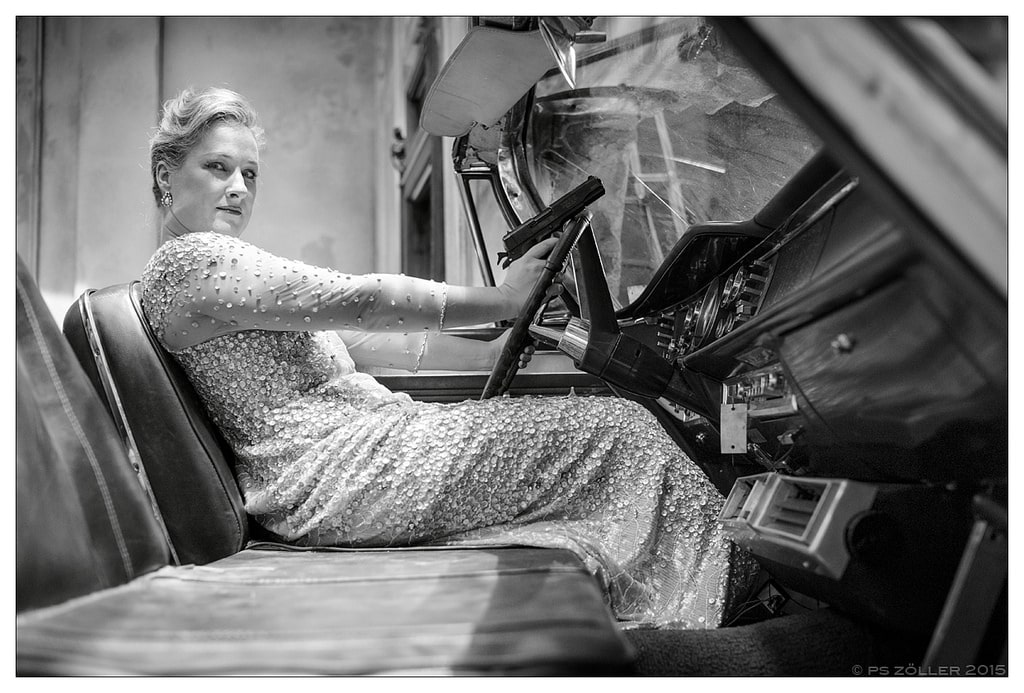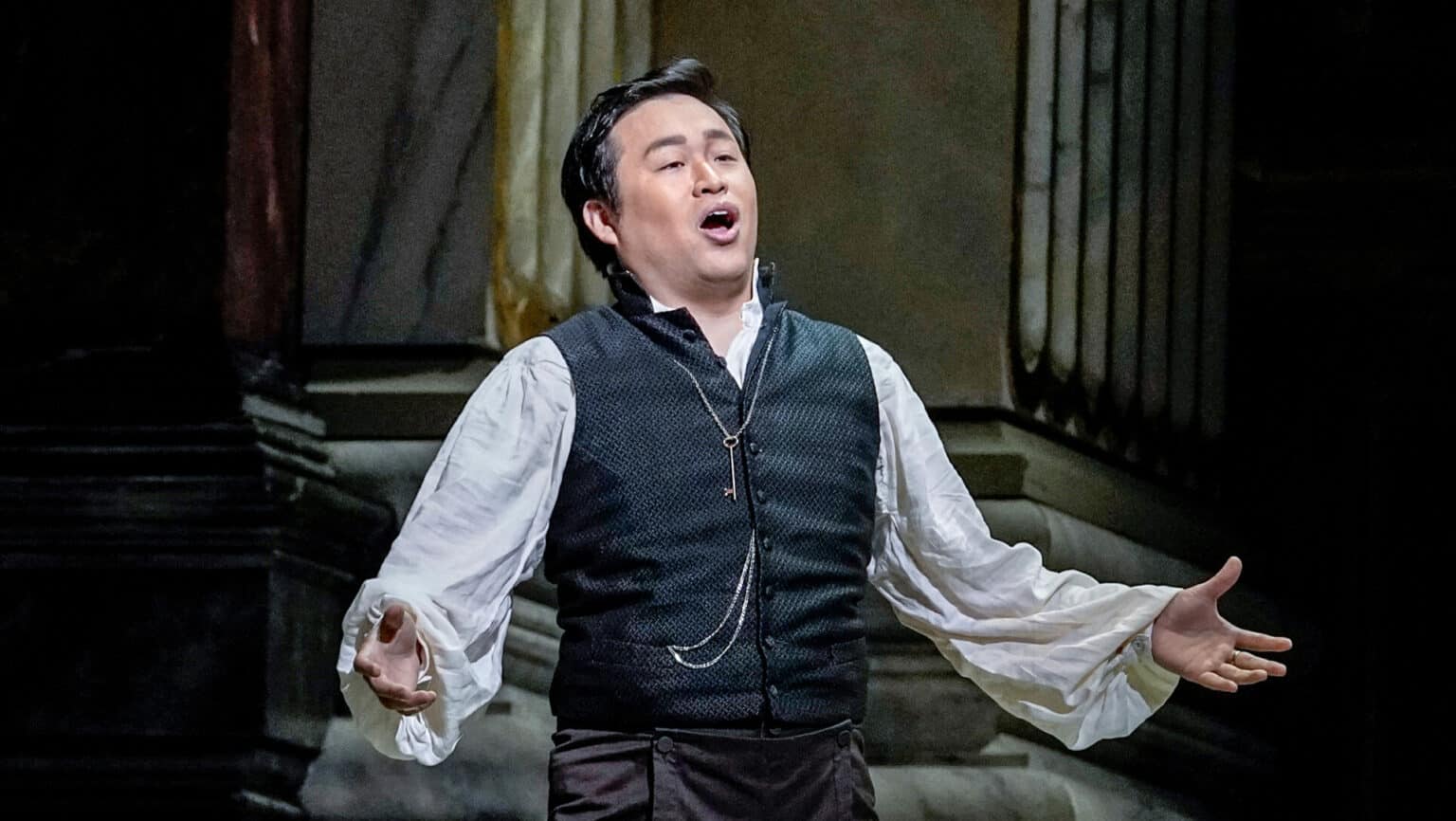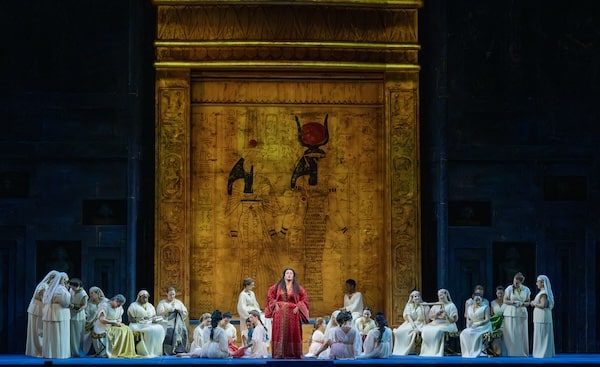When an LSO soprano cracks off, the violinist takes over
mainLast night at the London Symphony Orchestra, Diana Damrau failed to show up on stage. A concertgoer tells us what happened next:
Gianandrea Noseda walked to the podium at the Barbican before the beginning of the concert tonight with a microphone and said they had two inspiring rehearsals with Diana Damrau but when she came today her instrument was not with her. He said that she was present and asked the audience to support her. He added that 25 minutes before the concert the leader Roman Simovic agreed to play the Tchaikovsky Violin Concerto (it seems from his opening remarks that they did a partial rehearsal). He played the concerto beautifully.
After the interval Roman took back his seat and led the orchestra in a vibrant and exciting performances of Don Juan and Till Eulenspiegel.

From the LSO’s semi-official tweeter Maxine Kwok-Adams:
Just amazing! 25 mins notice and @londonsymphony leader #Romansimovic performs a stunning Tchaikovsky concerto on no rehearsal!! @violinchannel pic.twitter.com/QSFns10ofF
— Maxine Kwok-Adams (@Maxinekwokadams) March 31, 2019
And some other tweeters:
OMG it was amazing! Bravo to Roman, but also to Carmine for leading the 1st half so fantastically and everyone in the orchestra for a fabulous evening. There was so much love, support and classy musicianship. A privilege to be there.
— Charlotte Yuen (@charlotteyuen) March 31, 2019
Hands down the best performance of the Tchaikovsky I’ve ever seen @londonsymphony thank you for another incredible evening, am still on cloud 9 https://t.co/4TuhdlFv9M
— Stephanie Childress (@schildress_) March 31, 2019






Yes. It was amazing. All in a day’s work for the LSO and Roman. What other orchestra could pull this off?
Most orchestras could pull it off but what other leader could…he’s a star!
I once heard the RSNO’s then leader, Edwin Paling, play the Mendelssohn Concerto at extremely short notice when a soloist took ill at the last moment. He played it extremely well.
I know one orchestra that travels everywhere with a spare set of Haydn’s Trumpet Concerto on the van, in case of last minute soloist problems on the road: the principal trumpet can pull it out of the hat in an instant. The Tchaikovsky violin concerto is a rather bigger matter, of course!
“but when she came today her instrument was not with her.”
She’s a singer, not an instrumentalist.
Is this an April 1 story?
No, it’s an elegant way of saying that she was not in good voice. Is that not obvious?
I thought this metaphor was very poetic.
Evidently not.
https://bachtrack.com/review-simovic-noseda-strauss-tchaikovsky-london-symphony-barbican-march-2019
The vocal chords ARE an instrument
They are cords (not chords), and yes they are an instrument, and a pedant would point out that they were with her even if they weren’t in good condition. But everyone apart from Paul Brownsey understood what was meant.
You’ve spoken to everyone?
Everyone?
Yes everyone
That is exactly the type of musician top orchestras need to have in their leadership roles. He obviously earned his salary that evening. Bravo!
This story proves once and for all that the Tchaikovsky Violin Concerto is simply played much too often, and should be replaced 70% of the time by less performed accessible works, like the tremendous Egon Wellesz concerto: https://youtu.be/_zttIiEQN_I
^ April Fool’s!
(Srsly though, I agree with you: a piece well-known to violinists and orchestras, so that it can be performed on extremely short notice if necessary, and beloved by audiences, should be replaced by a piece nobody knows and no one will like. )
In fact, Bruce, people will know the piece “nobody knows” and will like the piece “nobody likes” if that piece gets performed from time to time. Just listen to the Wellesz concerto and get an opinion of your own, instead of being, let’s say, unkind.
Listened to the whole thing. Didn’t like it. It sparked my interest in a few places, then extinguished that spark a few moments later. Oh well. That’s not to say nobody would/ should/ could like it, or that it shouldn’t be played. I’d have no problem with it being programmed more often.
The context here, not that it’s worth pointing out, was a piece that can be programmed on a few hours’ notice, a decent job done on it, and audience members not demanding their money back. I guess you meant that the Wellesz concerto would be in the same position at the top of that particular hierarchy (currently occupied by Tchaikovsky, Mendelssohn et al) if only it would be programmed as often. That’s probably true of any piece.
Is it not a sad world, where the Tchaikovsky concerto (a masterwork) can be played at the drop of a hat by anybody, while the Wellesz concerto (also a masterwork) is played by virtually nobody?
Yes, the Wellesz concerto is superb and should be heard far more. It sounds more Schoenberg than Webern to me, which is a good thing as far as I’m concerned.
9th word to the end, you have a point.
Wow, great rebound. However, I would certainly want to hear the ambitious program Ms. Damrau had set up. I’m sorry she wasn’t up to it. I admire her greatly for pushing to get Bizet’s “Pearl Fishers” revived at The Met – a work they should do once in a while.
I was not at the concert in question, but I can attest that Simovic is a remarkable violinist, who has a long and distinguished track-record of playing solos on short notice.
In 2011, when Julia Fischer was indisposed, Simovic took over as soloist for the Sibelius concerto with the LSO (led by Carmine Lauri), albeit with a little bit more notice than the present case. It was a remarkable concert with an excellent sense of ensemble, with Simovic exuding a confident, assured performance with an exhilarating momentum.
A few years ago, when Roby Lakatos and his band gave a concert with the LSO, Simovic was called-up in the middle of the concert to play the Czardas, while Lakatos improvised an elaborate obbligato around it. The only notice he got then was the 2nd violinist in Lakatos’s band whispering to him a couple of minutes before, during the previous piece. Simovic, in true British fashion, could be seen shaking his head (quite violently, so it was definitely not the “shaking one’s head gently to indicate ‘yes’ ” common in the Balkans), but could not ultimately refuse after Lakatos made an announcement.
Good for him, but not surprising. The CM of any major orchestra is generally as good a player as most touring soloists. But not everyone can have a solo career, and some simply don’t want to do the travel. And I don’t know about the LSO, but CMs of top US orchestras are now earning around $500K (probably more when you add in teaching and some solo gigs). As a touring soloist you’d probably need to gross over $1 million/year in fees (so, 50 shows at $20k a pop) to have the same net income. Plus the travel.
More like 100 shows at $10,000 a time to earn $1m-a-year. Of course, repeating the programme Thu-Fri-Sat will help. However, the main drawback of this is the incessant grind of touring. (I also think the concerto repertoire of a solo violinist is rather boring; imagine playing the Tchaikovsky 30 times a year for 40 years.)
The London orchestras, of course, pay nowhere near $500K.